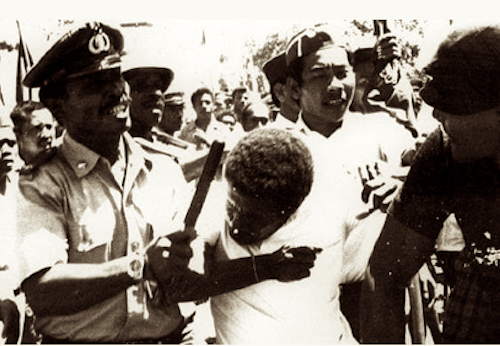A West Papuan leader has condemned the Melanesian Spearhead Group for abandoning the West Papuan cause in favour of a “corrupt alliance” with Indonesia.
Jeffrey P Bomanak, chairman of the Free Papua Organisation (OPM), declared last week’s MSG Leaders’ Summit ruling on West Papua a “betrayal” of the Papuan people and called for the regional group to be dissolved.
His response was among mounting criticism of the MSG’s denial of full membership for the United Liberation Movement for West Papua (ULMWP) alongside the Melanesian sovereign states of Fiji, Papua New Guinea, Solomon Islands and Vanuatu, and the Kanak and Socialist and National Liberation Front (FLNKS) that is seeking independence for Kanaky New Caledonia from France.
The upgrade from observer status to full members had been widely expected. Indonesia is an associate member of the MSG even though it is an Asian sovereign state.
“The act of deferring any decision on justice, sovereignty, and freedom for West Papua is because the MSG Secretariat and various MSG leaders have placed more importance on receiving Jakarta’s blood money than on the victims of Jakarta’s barbarity,” Bomanak declared in a statement today.
“For West Papuans, Melanesia is a symbol of genuine solidarity, where the value of brotherhood and sisterhood is not some abstract sentiment, but an ideal of kinship that is the pillar of our existence.
“Until last week, this ideal was still able to be expressed with hope.”
‘Chalice of betrayal’
The MSG had “quenched its thirst” for an unprincipled economic progress from the “chalice of betrayal”, Bomanak said.
“In doing so has fatally speared the heart of Melanesian kinship. Melanesia as our divine ideal in a unique ancestral affinity is dead.”
The OPM leader said that 25 August 2023 would be recorded by history as the day kinship was abandoned by the Melanesian Spearhead Group.
“It will be remembered as a day of infamy where our family nations joined the international abandonment of West Papua’s right to freedom, nation-state sovereignty, and to an end of the Holocaust Indonesia has brought into our island nation.”
The MSG was now a “fully-fledged member of the moral and ethical cancer” in international diplomacy where nations had no dilemma over the hundreds of thousands of West Papuan victims that was the cost of doing business with Indonesia.
“The military occupation of our ancestral lands by Indonesia, and the barbarity that we have been subjected to for six decades, leaves no room for ambiguity.
“Indonesia is our enemy, and our war of liberation will never stop until Indonesia has left our ancestral lands.
‘Freedom right intact’
“Our right to freedom remains intact even after every drop of our blood is spilled, after every village and family home is destroyed, after our Melanesian kin have acted in spiritual servitude to Indonesia’s batik diplomacy — selling their ancestral souls for generosity in blood money while we remain enslaved and refugees in our own land.”
Bomanak appealed to the remaining leaders of MSG nations which honoured “the true value of our kinship” to withdraw from the MSG.
The OPM has waged a diplomatic and military struggle against Indonesian rule since the 1970s.
Critics of the MSG stance claim that the Indonesian right to govern the West Papua region is contestable, even illegal.
West Papua and the Right to Self Determination under International Law – Melinda Janki
The Act of Free Choice 1969 which handed control of West Papua to Indonesia was a violation of international law. West Papua has never exercised its legal right to self https://t.co/mY4cmvm2e9… pic.twitter.com/QSZSykxiYY— Lewis Prai : West Papuan Diplomat (@PapuaWeb) March 13, 2023
A 2010 paper researched by one of the founders of International Lawyers for West Papua, Melinda Janki, called for a “proper act of self-determination” in accordance with international law.

In 1969, West Papua, then a former Dutch colony, was classified as an Indonesian province following a so-called “Act of Free Choice” carried out under Indonesian administration, but with only 1022 Papuan tribal representatives taking part in a referendum under duress.
Janki’s paper examined the process and concluded that it was a violation of the right of self-determination held by the West Papuan people under international law.
It studied Indonesia’s territorial claims and argued that these claims did not justify Indonesian sovereignty over West Papua.
The paper concluded that Indonesia’s presence in West Papua was illegal and
that this illegality is the basis for continuing conflict in West Papua.
Article by AsiaPacificReport.nz








